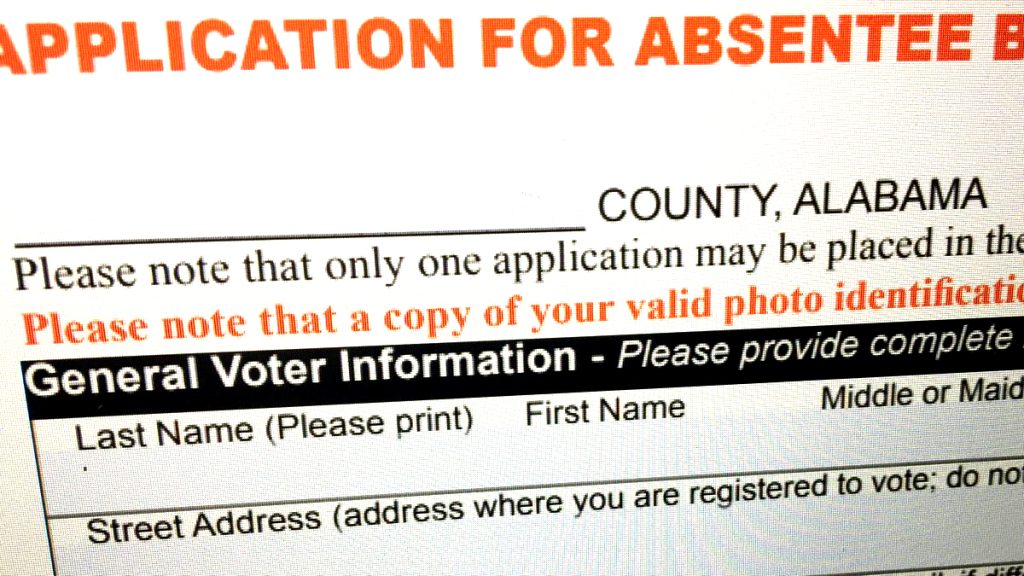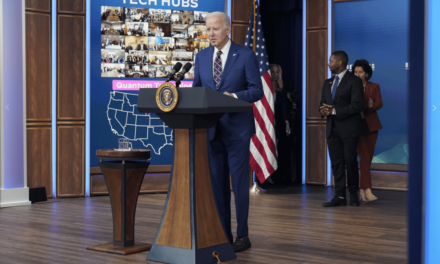By Mike Cason
Republican officials in Alabama are supporting a bill to make it a crime to provide an absentee ballot application for another voter.
They say a stricter law would prevent the distribution of unsolicited applications by people paid by campaigns or third-party groups trying to gain undue influence on voters.
Opponents of the bill, the first one filed for next year’s legislative session, point out that it would affect more than paid activists. Friends, neighbors, church members, and volunteers could face prosecution for giving an absentee ballot application to another voter.
The bill has exceptions for family members and people who share a household. It allows helping voters who are blind, disabled, or cannot read and write, exceptions mandated by federal law. Voters could also ask for help from employees who work in state and county election offices.
But otherwise, a person who orders, requests, or obtains an absentee ballot application for another voter could be charged with a Class A misdemeanor, which carries up to a year in jail and a fine of up to $6,000.
Absentee ballot applications are readily available. Voters with a computer and printer can download and print them from the secretary of state’s website. But absentee voting is still a challenge for some, according to those who oppose adding new restrictions.
“It’s a confusing process, and especially for our seniors,” Rep. Adline Clarke, D-Mobile said. “We need to be doing all we can to simplify the process, not make it more complicated and criminalizing somebody’s actions if they should seek to help somebody who’s not their blood relative.”
Clarke said people who help senior citizens with absentee voting in her district do it to be good neighbors.
“In some cases, those individuals that they are assisting don’t have close relatives here,” Clarke said. “Their children might be clear across country. They may not have sisters and brothers who are still living. So that legislation would really restrict an individual’s ability to exercise their right to vote and to vote absentee.”
Alabama law already prohibits mailing in an absentee ballot application for another voter or hand-delivering it to the county absentee election manager. The prohibition is printed in red text on the application, along with criminal penalties. It means that third-party collections of absentee ballots, sometimes called ballot harvesting, is already illegal in Alabama.
But Republican Secretary of State Wes Allen and Rep. Jamie Kiel, R-Russellville, House sponsor of the bill, said the current law is vague. Kiel said the bill would clarify and strengthen the law but would not prevent voter assistance when it’s needed.
“I was very clear back during the last session that it’s not our intention to keep people from voting,” Kiel said.
In May, the Republican majority in the House passed Kiel’s bill over opposition from Democrat. But the bill did not come up for a vote in the Senate.
Sen. Garlan Gudger, R-Cullman, has pre-filed it for the 2024 session, which starts in February. It is listed as Senate Bill 1, (SB1).
“We’ve absolutely got to maintain our absentee ballot voting,” said Secretary of State Allen, a former House member who also has experience administering elections as a former probate judge in Pike County. “There are a lot of people out there that utilize it and we want to protect it from being manipulated. SB1 is a strong bill. The current law now is vague. SB1 strengthens the absentee balloting process. It protects against manipulation. I feel that SB1 protects Alabama citizens who legitimately require assistance to vote.”
Kiel said the purpose of the bill is to prevent political activists and consultants from profiting off the absentee process and to stop potential fraud.
“You’ve got someone that you don’t know and I don’t know that goes to a residential complex and goes door-to-door filling out applications,” Kiel said. “And then once they fill out the applications then they’ve got the person’s address and they know it was submitted. Then they can follow up and quote, help, with a ballot. There’s ample opportunity for bad things to happen.”
The bill makes it a felony to receive payment or to pay someone to distribute, order, request, or obtain an absentee ballot application for another voter.
But, as opponents point out, the criminal sanctions would not be limited to people who pay or get paid. The first section of the bill makes it a misdemeanor for anybody to “order, request, collect, prefill, obtain, or deliver” an absentee ballot application for another person.
Kathy Jones, state president of the League of Women Voters of Alabama, said the bill would criminalize some of the work the organization’s local chapters and volunteers do to promote election participation.
Jones said they set up tables at senior centers, libraries, churches, thrift-store parking lots, and college campuses. They help people register to vote or update their registration. The bill would not prohibit that.
But it would affect the help with absentee ballot applications provided by the League and other organizations, Jones said. For voters who seek their help, Jones said volunteers print the applications, which are specific by county, and provide envelopes and address labels.
Jones said the exception the bill provides for people with disabilities will not cover everyone who seeks or needs assistance.
“Our members would be at risk of being prosecuted for a Class A misdemeanor for proving assistance to people who asked for help,” Jones said.
Allen said people who are not disabled but who need help can get that from county election offices and from employees with the secretary of state’s office, as stated in the bill. The secretary of state’s website has information about absentee voting, absentee ballot applications by county, and a roster of absentee election managers and their addresses by county.
“It’s very easy to go on and find the application,” Kiel said.
Allen and Kiel said absentee voting is the part of elections in Alabama must vulnerable to fraud.
Allen said the secretary of state’s office has received reports from voters about receiving unsolicited, pre-filled absentee ballot applications from out of state groups.
“That’s one thing that SB1 would prohibit,” Allen said. “It causes confusion, specifically with the elderly, when the elderly receive these pre-filled absentee ballot applications.”
Allen did not provide any specific examples of where and when that happened. He said those reports to the secretary of state’s office came before he took office in January.
Allen said SB1 would place some new limitations on the voter assistance efforts like those done by the League of Women Voters and other organizations. But he believes it is the best policy.
“A lot of time and effort and research has went into drafting this piece of legislation,” Allen said. “And we feel it’s at a place where it’s a strong bill that protects the absentee process while protecting the voters.”











